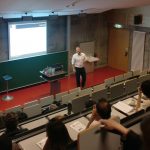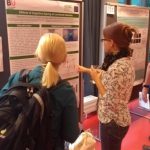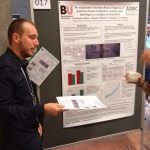 Jan Wiener, Ramona Grzeschik and Chris Hilton represented the Ageing & Dementia Research Centre (ADRC) at the 40th European Conference on Visual Perception (ECVP) 27–31 August 2017 in Berlin and the 20th Conference of the European Society for Cognitive Psychology (ESCoP) 3-6 September 2017 in Potsdam.
Jan Wiener, Ramona Grzeschik and Chris Hilton represented the Ageing & Dementia Research Centre (ADRC) at the 40th European Conference on Visual Perception (ECVP) 27–31 August 2017 in Berlin and the 20th Conference of the European Society for Cognitive Psychology (ESCoP) 3-6 September 2017 in Potsdam.
The ECVP is an annual meeting that brings together researchers from Psychology, Neurosciences, Optics, Computational Sciences and more. Besides vision, other modalities are represented as well as their interaction (multisensory perception). The conference of the ESCoP is being held once every two years. The society’s mission is “the furtherance of scientific enquiry within the field of Cognitive Psychology and related subjects, particularly with respect to collaboration and exchange of information between researchers in different European countries”.
 Ramona represented the ADRC at both conferences with her ESRC-funded project on Dementia-friendly environments. In particular, she presented a poster with the latest results of her wayfinding experiment where she investigated the route learning abilities and eye movements of young and old participants.
Ramona represented the ADRC at both conferences with her ESRC-funded project on Dementia-friendly environments. In particular, she presented a poster with the latest results of her wayfinding experiment where she investigated the route learning abilities and eye movements of young and old participants.
At the ESCoP conference, Jan gave a talk on “What can eye-tracking tell us about the cognitive mechanisms underlying successful navigation?” where he introduced a couple of experiments that investigated eye movements during route and place learning in Virtual Environments.
 Chris presented his results at the ESCoP as well. His poster titled “An exploration into the effects of ageing on general control of attention during route learning in a complex environment.” escribed his experiment using a natural looking virtual environment called “Virtual Tübingen”. He investigated attentional engagement during a route learning task in young and old participants.
Chris presented his results at the ESCoP as well. His poster titled “An exploration into the effects of ageing on general control of attention during route learning in a complex environment.” escribed his experiment using a natural looking virtual environment called “Virtual Tübingen”. He investigated attentional engagement during a route learning task in young and old participants.












 Second NIHR MIHERC meeting in Bournemouth this week
Second NIHR MIHERC meeting in Bournemouth this week Dr. Ashraf cited on ‘Modest Fashion’ in The Guardian
Dr. Ashraf cited on ‘Modest Fashion’ in The Guardian NIHR-funded research launches website
NIHR-funded research launches website MSCA Postdoctoral Fellowships 2025 Call
MSCA Postdoctoral Fellowships 2025 Call ERC Advanced Grant 2025 Webinar
ERC Advanced Grant 2025 Webinar Horizon Europe Work Programme 2025 Published
Horizon Europe Work Programme 2025 Published Horizon Europe 2025 Work Programme pre-Published
Horizon Europe 2025 Work Programme pre-Published Update on UKRO services
Update on UKRO services European research project exploring use of ‘virtual twins’ to better manage metabolic associated fatty liver disease
European research project exploring use of ‘virtual twins’ to better manage metabolic associated fatty liver disease